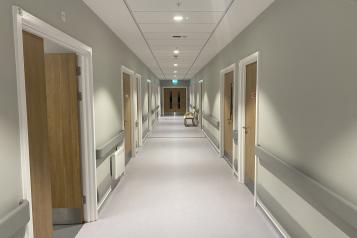Healthwatch position on safe hospital discharge

In March 2020, the Government introduced a new hospital discharge policy to help the NHS free up beds by getting people out of hospital quickly. This meant anyone who needed out-of-hospital support to help them recover would now have their needs assessed after being discharged, rather than in hospital.
What we’re calling for
After assessing how the new policy was affecting people's experience of leaving hospital, we called for the following:
- Better provision of post-discharge support, including:
- Wellbeing checks carried out by community and voluntary services.
- Hospitals signposting and connecting people to other voluntary services, which can provide additional support.
- An understanding of why the number of follow-up visits were low, including a review of the discharge pathways model in the guidance from 2020.
- Clear responsibility for who will arrange people’s transport home and who to contact if their condition worsens.
- Greater involvement of family and carers in decisions about patient discharge.
Many of our recommendations were adopted in an updated policy released in 2021, and centralised funding was extended for a year. However, the unavailability of social care now means most areas are finding it very difficult to implement the ‘home-first’ principles of the discharge to assess policy.
We support centralised, ring-fenced funding for hospital discharge. The Government and the sector urgently need to focus on solutions to workforce and capacity in social care to help resolve the growing numbers of delayed discharges.
Our evidence
To understand the impact of the new hospital discharge policy in 2020, we spoke to over 500 patients and carers and conducted 47 in-depth interviews.
We found significant positives to the new discharge process for staff and patients, particularly better joined-up working between health and social care services. The national policy helped to reduce bureaucracy by encouraging services to quickly set up discharge services according to a single standard model.
However, we also found that the discharge policy wasn’t always working how it should on the ground.
- 82% of respondents did not receive a follow-up visit and assessment at home and almost one in five of these reported an unmet care need.
- Some people felt their discharge was rushed, with around one in five (19%) feeling unprepared to leave hospital.
- Over a third (35%) of people were not given a contact who they could get in touch with for further advice after discharge, despite this being part of the guidance.
Centralised funding administered by the NHS was made temporarily available to support the new national ‘discharge to assess’ policy. Our interviews with staff found that this centralised funding enabled quick and safe hospital discharge by removing administrative and financial barriers between the hospital, community health and social care teams.
Our work
Our recommendations directly led to an updated national hospital discharge policy, including:
- Emphasising that people should not be discharged at night and they should always be informed about the next stages of their care.
- Even if someone leaving hospital doesn’t need a formal assessment for a care and support package, they should be signposted to informal community support.
- Everyone leaving hospital should receive a holistic welfare check to determine the level of support, including non-clinical factors, such as their physical, practical, social, psychological and financial needs.
- Better ways of involving and assessing the needs of carers when discharging patients.
- Greater clarity on who is responsible for each step of the process and staff arrangements, aiming to further improve collaboration and data-sharing between health and social care services.
When centralised NHS funding for hospital discharge was set to expire in 2021, we called for an extension with the support of eight other national organisations. This helped secure £600 million Government funding for another year.
Although centralised funding for hospital discharge was suspended in April 2022, in October 2022 the Government announced a new £500m adult social care discharge fund which should serve many of the same functions. Details of how this fund will be distributed have only recently been announced, and we will be collecting evidence on its impact to feed into further development of policy.

